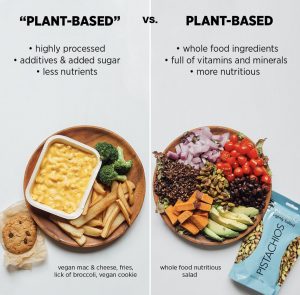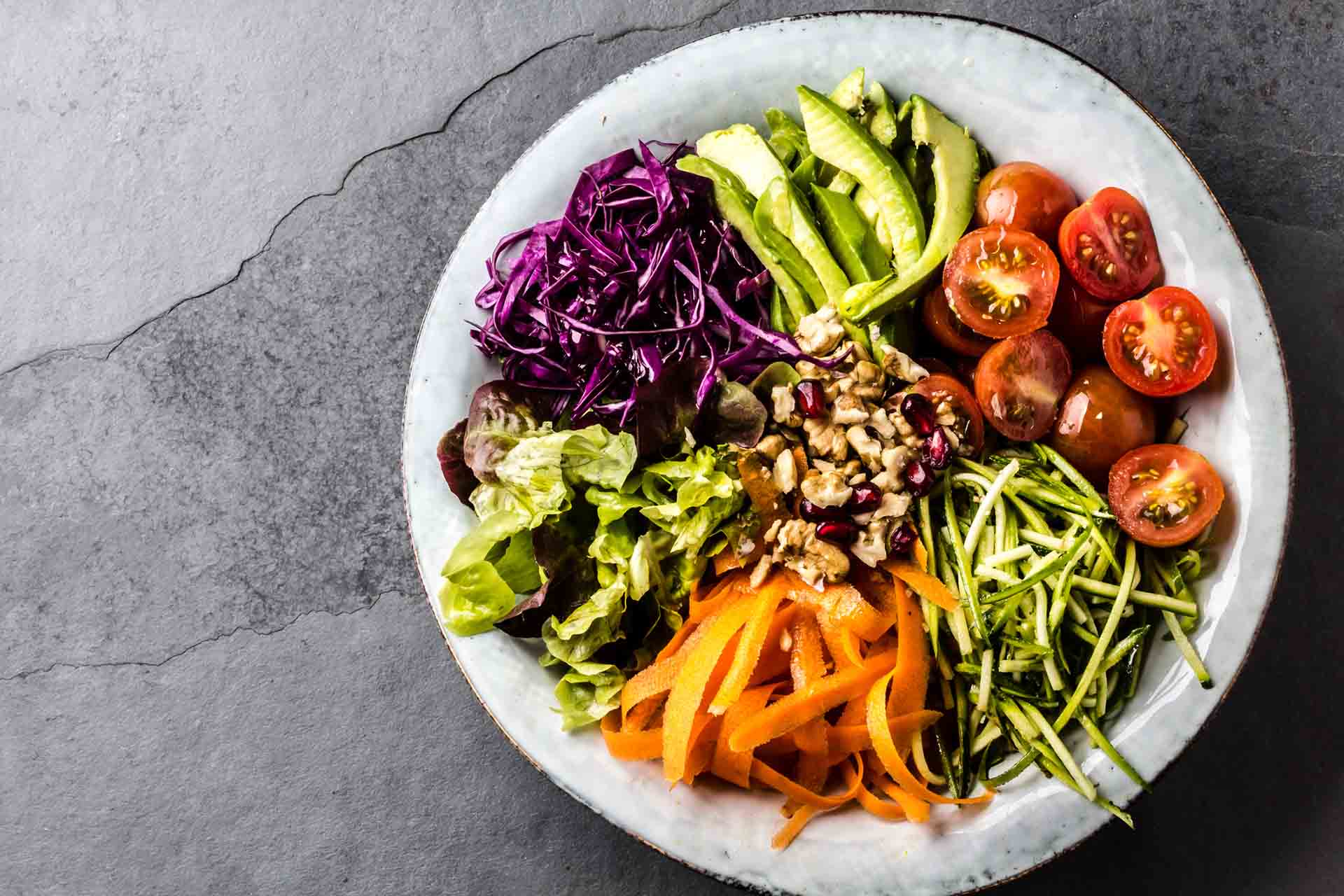All Regarding Healthy Food: Benefits of Taking On Plant Based Alternatives
The conversation surrounding plant-based diet plans has gained substantial focus in the last few years. Numerous individuals are discovering the possible health and wellness benefits, dietary benefits, and ecological effects connected with these nutritional options. As people become extra mindful of their food's impact on health and sustainability, concerns occur about the usefulness of taking on such a way of life. What specific adjustments can one expect, and how might these selections reshape not just individual health yet likewise the earth's future?
Recognizing Plant-Based Diets
Numerous individuals associate plant-based diet regimens primarily with vegetarianism or veganism, these diet regimens can encompass a vast variety of consuming patterns that prioritize entire, minimally processed plant foods. Such diet plans often consist of fruits, veggies, whole grains, nuts, seeds, and beans, while restricting or eliminating pet products. This versatility permits people to tailor their nutritional selections according to personal preferences and dietary demands. Some might adopt a mainly plant-based diet while still sometimes consuming meat or dairy, typically described as a flexitarian approach. The focus stays on integrating even more plant foods, which can bring about a diverse range of flavors and meals. Recognizing these various analyses of plant-based eating is important for appreciating its access and appeal in contemporary food culture.
Health And Wellness Perks of Plant-Based Foods
The health benefits of plant-based foods are significant, providing a nutrient density advantage that supports overall well-being. Research indicates that these foods can improve heart health and play a vital function in efficient weight administration. By integrating much more plant-based choices, individuals may enhance their dietary selections and advertise lasting health and wellness.
Nutrient Density Advantage
Nutrient density plays an essential role in the wellness advantages of plant-based foods, making them an engaging option for those seeking a balanced diet. Plant-based foods, such as fruits, vegetables, beans, nuts, and entire grains, are usually abundant in necessary vitamins, minerals, and anti-oxidants while being lower in calories. This high nutrient density allows people to take in fewer calories while still meeting their nutritional demands. Furthermore, these foods are packed with nutritional fiber, advertising digestion health and assisting in weight administration. By incorporating nutrient-dense plant-based alternatives, consumers can enhance their total health and wellness, sustain their body immune systems, and decrease the threat of chronic diseases. Eventually, the nutrient thickness of plant-based foods highlights their importance in a health-conscious way of living.
Heart Health And Wellness Renovation

Weight Management Assistance
Along with promoting heart wellness, a plant-based diet plan can considerably help in weight management. This nutritional approach highlights entire foods such as fruits, vegetables, beans, nuts, and whole grains, which are usually lower in calories and higher in fiber compared to animal-based products. The high fiber web content helps raise satiation, decreasing total calorie intake. Plant-based diet regimens are often rich in crucial nutrients while low in undesirable fats, making it much easier to keep a healthy weight. Research study shows that people who embrace a plant-based way of life often tend to have reduced body mass indexes (BMIs) and experience more successful fat burning contrasted to those who consume meat-heavy diet plans. As a result, accepting plant-based alternatives is a strategic choice for effective weight administration
Nutritional Value of Plant-Based Ingredients
Plant-based ingredients are abundant in crucial nutrients, supplying a diverse selection of vitamins, minerals, and anti-oxidants that add to total wellness. A contrast of healthy protein resources exposes that while animal products are frequently seen as exceptional, numerous plant-based choices offer sufficient protein and various other beneficial substances. Recognizing the nutritional value of these components can help individuals make notified nutritional choices.
Vital Nutrients in Plants
Nutrient-rich components discovered in plants offer a varied selection of necessary minerals and vitamins that contribute greatly to overall wellness. These components are rich in vitamins A, C, and K, which sustain immune function, vision, and blood clotting, specifically. Furthermore, plants provide vital minerals such as magnesium, calcium, and potassium, important for heart health, muscular tissue function, and bone toughness. The existence of fiber in plant-based foods help digestion and promotes a healthy gut microbiome. Anti-oxidants, found generously in vegetables and fruits, help battle oxidative stress and minimize inflammation. Numerous plant foods are reduced in calories yet high in nutrients, making them an outstanding selection for those seeking to preserve a healthy and balanced weight while ensuring suitable nutrient consumption.

Contrasting Healthy Protein Resources
Protein sources differ substantially in their nutritional profiles, with plant-based active ingredients supplying special advantages. Unlike animal healthy proteins, which typically have hydrogenated fats and cholesterol, plant proteins tend to be lower in these unhealthy parts. Legumes, nuts, seeds, and whole grains are rich in crucial amino acids, fiber, vitamins, and minerals. Lentils give high healthy protein content together with significant iron and folate, while quinoa is a full protein, offering all 9 important amino acids. In addition, plant-based proteins are usually gone along with by anti-oxidants and phytochemicals that support total health and wellness. The change to plant-based protein resources not just improves dietary intake however also lines up with lasting dietary techniques, reducing ecological influence and promoting lasting health benefits.
Ecological Impact of Plant-Based Eating
As recognition of climate modification expands, several individuals are checking out lasting dietary options that can substantially lessen their environmental you could try here impact. Plant-based consuming has emerged as a considerable factor to reducing greenhouse gas emissions, which are mostly connected with livestock production. The growing of fruits, veggies, grains, and vegetables typically calls for less resources, such as water and land, compared to pet farming. Furthermore, plant-based diet plans can cause reduced logging, as less land is required for grazing animals or expanding pet feed. By moving towards plant-based options, customers can support biodiversity and advertise much healthier ecological communities. Overall, welcoming plant-based consuming not only benefits individual wellness yet additionally represents an essential action towards environmental sustainability and preservation initiatives.
Conquering Common Misconceptions
While several individuals identify the benefits of a plant-based diet regimen, a number browse around here of misunderstandings frequently hinder them from fully accepting this way of living. An usual belief is that plant-based diet plans lack enough healthy protein; nonetheless, numerous plant resources, such as vegetables, nuts, and tofu, give enough protein. Additionally, some think that this diet is pricey, when in fact, staples like beans, rice, and seasonal vegetables can be quite budget-friendly. Another misunderstanding is that plant-based eating is excessively limiting, whereas it really uses a varied array of foods and tastes. Ultimately, several stress that a plant-based diet plan may cause shortages, yet with appropriate planning, individuals can obtain all necessary nutrients, including minerals and vitamins, while delighting in a variety of tasty dishes.
Tips for Transitioning to a Plant-Based Way of living
Making the shift to a plant-based way of life can be an enhancing experience, though it usually requires some support to navigate the preliminary modifications. First, individuals are encouraged to begin progressively, integrating more fruits, vegetables, vegetables, and entire grains into their meals while minimizing meat and dairy consumption. Dish planning is essential; preparing an once a week menu can aid reduce the change and avoid final harmful options. Checking out new recipes and cooking approaches can additionally boost the experience and maintain enjoyment concerning plant-based consuming. In addition, joining support system or neighborhoods can offer inspiration and share important suggestions. Staying educated regarding nutrition assurances balanced meals, stopping shortages while cultivating a healthy and balanced, enjoyable plant-based lifestyle.

Delicious Plant-Based Dish Concepts
Discovering tasty plant-based dish ideas can motivate individuals to embrace a more healthy diet. One popular option is a hearty quinoa salad, featuring cherry tomatoes, cucumber, and a zesty lemon-tahini dressing. Another fave is a savory lentil stew, packed with carrots, celery, and aromatic natural herbs, excellent for a soothing supper. For morning meal, overnight oats made with almond milk, chia seeds, and topped with fresh berries supply a nutritious beginning to the day. Furthermore, a vivid veggie stir-fry with tofu and a selection of vivid veggies can be a fast yet pleasing meal. Lastly, velvety avocado toast on whole-grain bread, sprayed with seasonings and seeds, provides a simple yet delicious treat. These meals showcase the selection and richness of plant-based eating.

Frequently Asked Inquiries
Can a Plant-Based Diet Plan Offer Enough Protein?
The concern of whether a plant-based diet plan can offer adequate healthy protein is usual. Many resources, consisting of vegetables, nuts, seeds, and whole grains, can meet protein requires successfully, supporting a nutritious and balanced diet plan for individuals.
Are Plant-Based Diet Regimens Ideal for Kid?
The suitability of plant-based diet plans for youngsters depends on careful preparation. Sufficient nutrients must be guaranteed, including healthy proteins, vitamins, and minerals. With appropriate assistance, such diet regimens can sustain healthy and balanced development and development in children.
How Do I Eat in restaurants on a Plant-Based Diet plan?
Dining out on a plant-based diet regimen entails looking for dining establishments with varied menus, asking for modifications, and exploring vegan-friendly choices. Preparation in advance and communicating dietary preferences can boost the dining experience while preserving nutritional choices.
What Prevail Allergens in Plant-Based Foods?
Usual irritants in plant-based foods consist of soy, gluten, nuts, and go to website seeds - Plant Based Beef. People adhering to a plant-based diet plan must be mindful of these allergens and check out tags carefully to prevent adverse reactions and ensure secure usage
Can Plant-Based Diets Assist With Weight Management?
Research suggests that embracing a plant-based diet regimen might assist in weight loss because of its normally reduced calorie thickness and higher fiber material. This mix can improve satiation, aiding people manage their caloric intake successfully. Several people link plant-based diets mostly with vegetarianism or veganism, these diets can encompass a large range of eating patterns that prioritize entire, minimally processed plant foods. Nutrient thickness plays an essential role in the health benefits of plant-based foods, making them a compelling choice for those looking for a well balanced diet. Plant-based diet plans have been shown to substantially boost heart health and wellness, as they often contain aspects that support cardiovascular feature. In addition to promoting heart wellness, a plant-based diet regimen can significantly assist in weight monitoring. A typical idea is that plant-based diets do not have enough healthy protein; nonetheless, many plant sources, such as legumes, nuts, and tofu, provide enough healthy protein.